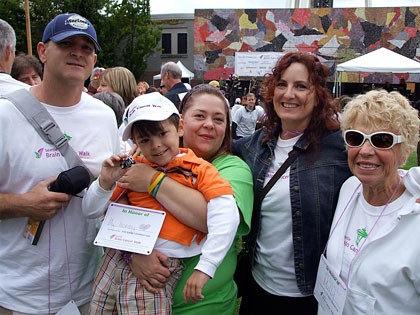SEATTLE — Brain cancer survivor Molly McMurphy of Marysville has defied the odds in a big way and she hopes to help others in her situation do the same.
“I was diagnosed in May of 2001,” said McMurphy, whose “Molly’s Chambers” team raised more than $1,800 at the Seattle Brain Cancer Walk June 26. “Only 2 percent of people diagnosed with brain cancer make it this far.”
For six years, McMurphy believed that her cancer had abated, but last year her cancer returned — or rather, it had never left.
“I was getting poor information from the MRIs I’d been receiving, but when I got a new neuro-oncologist, I learned that I’d simply been ignorant of its presence,” McMurphy said. “What’s terrifying about brain cancer is that it’s the only cancer that never goes away entirely. Brain cancer treatments can only stunt its growth before it becomes too intrusive.”
McMurphy’s brain cancer has become inoperable, since it’s wrapped itself around blood vessels that feed her brain. She noted that 92 percent of brain cancer patients die within 18 months of being diagnosed. She credited her continued survival to luck, faith and the support of friends and family, including her husband Donnie and her son Sailor.
“This is the first time that I’ve actually done the Seattle Brain Cancer Walk,” McMurphy said. “I’d started a team last year, but I found out that my brain cancer was back just before the walk, so I was feeling really vulnerable and not knowing how to be around other people for a while.”
McMurphy is on chemotherapy, and her inability to continue working has reduced her family’s incomes even further, after they’ve already been hard-hit by the current economy.
“I was a real estate agent and my husband is in construction,” McMurphy said. “I used to very smart, but my memory is going and I’m distracted easily now. My ability to manage a career and a household is gone, so I’m relying on other people while trying not to be too vulnerable. When you can’t remember which bills you’ve paid or if your kid is in kindergarten, it becomes hard to balance the reality of your situation with the hope of having your life back.”
McMurphy explained that, while there are many organizations that support cancer patients, most of them are targeted toward very specific types of cancer. She elaborated that not only is brain cancer “very rare,” but also that a majority of funds available for brain cancer patients are reserved for those in stage 4, the final phase of the disease.
“Most insurance doesn’t cover brain cancer treatment, because there’s no cure for it and no protocol,” McMurphy said. “The composition of brain cancer tumors is so specific to the individual who has it that a treatment that works on one person’s tumor has no guarantee of working on another’s.”
McMurphy acknowledged that her first go-round with brain cancer had already cost her a home, a job and a family car, but laughed as she pointed out that she had little left to lose when she was diagnosed with the disease again last year.
“The people who face this and fight it are engaged in an impossible battle,” McMurphy said. “Whoever beats this will be the first person why ever does.”



